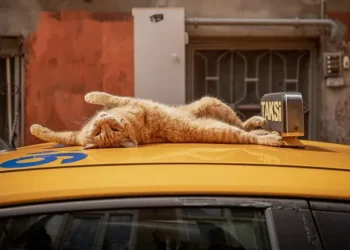Why Orange Cats Are One-of-a-Kind, According to Science
Orange cats have long charmed pet lovers with their bold personalities and playful antics. But a new genetic study suggests these ginger felines are even more exceptional than we thought — and not just because of their attitude.
A team of researchers from Stanford University has pinpointed the rare DNA mutation that gives orange cats their signature hue. The findings, published May 15 in Current Biology, not only solve a long-standing genetic mystery but also highlight a mutation unlike any seen in other animals.
The Quirky Genetics Behind Ginger Fur
It’s no secret that most fully orange cats are male. That’s because the gene responsible for orange coloring lives on the X chromosome. Male cats have just one X chromosome (alongside a Y), so if that single X carries the orange trait, the cat turns out entirely orange. Female cats, on the other hand, have two X chromosomes — and both must carry the orange gene for a female to be completely orange. Otherwise, she ends up with a patchy calico or tortoiseshell coat.
Scientists have known this much for decades. But what they didn’t know was where exactly on the X chromosome the mutation occurred — or how it made cats orange in the first place.
That mystery is now a step closer to being solved.
A Decade of Cat Shows and DNA Swabs
Stanford geneticist Christopher Kaelin has spent the past ten years attending cat shows, cheek swab in hand, collecting DNA samples from ginger cats across the country. Comparing those samples to existing feline genome databases, his team zeroed in on 51 unique genetic variants shared among orange male cats.
After ruling out 48 of them, they focused on a tiny but powerful culprit: a 5,076-base pair deletion — just 0.005% of the X chromosome. Surprisingly, this deletion wasn’t located within any gene. Instead, it sat between two regions near a gene called Arhgap36, which helps regulate hormonal signaling in mammalian cells — but had no known connection to fur color.
That’s when things got interesting.
A Mutation That Turns Off Black, Turns On Orange
To understand the deletion’s impact, Kaelin and his team analyzed tissue samples from spay and neuter clinics. They discovered that the deletion somehow activates Arhgap36 in pigment-producing cells — where the gene normally doesn’t operate. Once activated, it blocks the production of black pigment, allowing only orange pigment to shine through.
This peculiar genetic switch has never been found in any other animal species — not even the wild ancestors of house cats. According to Kaelin, that suggests the mutation likely emerged once, thousands of years ago, and was selectively passed down through generations of domestic cats.
“We see the same mutation in all orange cats we’ve studied, across wide geographic regions,” Kaelin explained. “It’s a single, ancient mutation — and there are even depictions of calico cats in 12th-century Chinese art that hint at its deep history.”
A Unique Case That Could Help Broader Genetics Research
While the study focuses on feline fur, its implications reach beyond cats. The researchers hope their findings can shed light on how mutations — even ones outside of genes — can alter gene activity in unexpected ways.
“This is a really unusual type of mutation,” said senior author Greg Barsh, professor emeritus of genetics at Stanford. “It shows us that we still don’t fully understand all the mechanisms that drive traits, even in well-studied species.”
Understanding these mechanisms could also help explain genetic conditions in humans that have no obvious cause. Sometimes, it’s not that we haven’t found the mutation — it’s that we haven’t understood how it works.
So… Are Orange Cats Really Nicer?
There’s a popular belief among cat owners that orange cats are more sociable, goofy, or affectionate than others. But Kaelin’s team isn’t convinced the genetics explain the personality.
“I think orange cats have really convinced their owners that they’re different,” Kaelin joked, “but they’ve yet to convince us.”
Still, now that the genetic groundwork is laid, future studies could investigate whether there’s a link between coat color and temperament.
This article was rewritten by JournosNews.com based on verified reporting from trusted sources. The content has been independently reviewed, fact-checked, and edited for accuracy, neutrality, tone, and global readability in accordance with Google News and AdSense standards.
All opinions, quotes, or statements from contributors, experts, or sourced organizations do not necessarily reflect the views of JournosNews.com. JournosNews.com maintains full editorial independence from any external funders, sponsors, or organizations.
Stay informed with JournosNews.com — your trusted source for verified global reporting and in-depth analysis. Follow us on Google News, BlueSky, and X for real-time updates.














